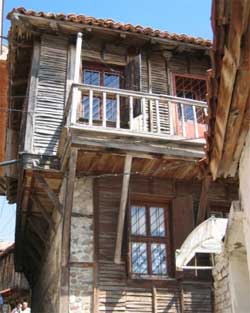Sozopol

One
of the earliest towns on the Bulgarian Black Sea coast, derived
from the ancient Thracian settlement Apollonia - The town of the
God of Apollo. In 610 B.C. Greeks coming from Malaysia - from the
cities of Millet and Fokea settled the nowadays Sozopol peninsula
and established a town. Its location was well chosen, it was situated
on the routes to Thrace and Strandza. The town quickly became illustrious
and got surrounded by newly constructed settlements. That was a
time of cultural bloom, of flourishing construction industry and
prospering trade. Apollonia minted coins of its own. Apollonia is
known with the Temple of Apollo. However, in 72 BC the legions of
Mark Lukul destroyed as the fortress wall and the Temple and other
buildings as well. During the IV c. BC along with the growth of
Constantinople, Apollonia got its significance back. It was known
under the name Sozopolis - town of salvation.
In 812 Khan Krum annexed the town to the Bulgarian country, but
later on it changed hands back and forth from Bulgarian to Byzantine
several times.
During the centuries Sozopol developed as a defensive town with
own fortified wall and fortifications on one hand and as a town
with luxuriant architecture of its religious buildings, churches,
chapels, cemeteries, monasteries.
Until 1454 when it fell under Ottoman rule, Sozopol was undergoing
its Renaissance - being a seaport and trade center between Bulgaria
and the Mediterranean cities. The time left its traces on the territory
of Sozopol's municipality. The archaeologists unearth more and more
finds left from far-off times.